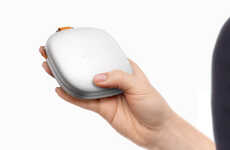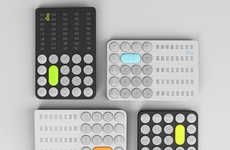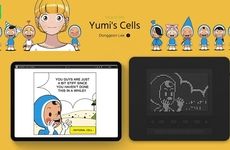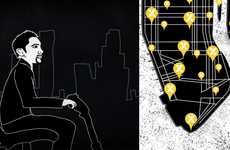
Tactile Tablet Blitlab Lets Blind People Read, Write and Chat
Alyson Wyers — July 9, 2015 — Tech
References: blitab & springwise
This award-winning tactile tablet is designed to convert text into Braille for the visually impaired. Blitlab enables blind users to read, write and chat by mapping out letters, graphics and geometric figures.
Braille plays an integral role in how the blind community communicates with seeing people. The tactile tablet uses liquid-based tech to create bubbles that become raised or flat on demand. Blitlab also lets users type using a Braille Perkins Keyboard without any mechanical elements. It can convert PDF, TXT, Doc and other file extensions into Braille by simply inserting files with USB sticks.
The Australian company's combination of new technology with the sense of touch is just one example of how modern inventions are able to help those with disabilities.
Braille plays an integral role in how the blind community communicates with seeing people. The tactile tablet uses liquid-based tech to create bubbles that become raised or flat on demand. Blitlab also lets users type using a Braille Perkins Keyboard without any mechanical elements. It can convert PDF, TXT, Doc and other file extensions into Braille by simply inserting files with USB sticks.
The Australian company's combination of new technology with the sense of touch is just one example of how modern inventions are able to help those with disabilities.
Trend Themes
1. TACTILE TABLETS - The development of tactile tablets allows visually impaired individuals to read, write, and communicate using Braille, opening up new possibilities for accessibility and inclusion.
2. LIQUID-BASED TECHNOLOGY - The use of liquid-based technology in tactile tablets offers the potential for more versatile and responsive tactile displays, enhancing the user experience for those with visual impairments.
3. FILE CONVERSION - The ability of tactile tablets to convert various file extensions into Braille, such as PDF, TXT, and Doc, simplifies the process of accessing written content for individuals with visual impairments.
Industry Implications
1. EDUCATION TECHNOLOGY - Tactile tablets have the potential to revolutionize education for visually impaired students, providing them with more accessible and interactive learning materials.
2. ASSISTIVE TECHNOLOGY - Tactile tablets represent a significant advancement in assistive technology, offering a new way for visually impaired individuals to navigate and interact with digital content.
3. PUBLISHING - The integration of tactile tablets into the publishing industry could enable the production of accessible Braille versions of books, magazines, and other written materials.
3.1
Score
Popularity
Activity
Freshness























